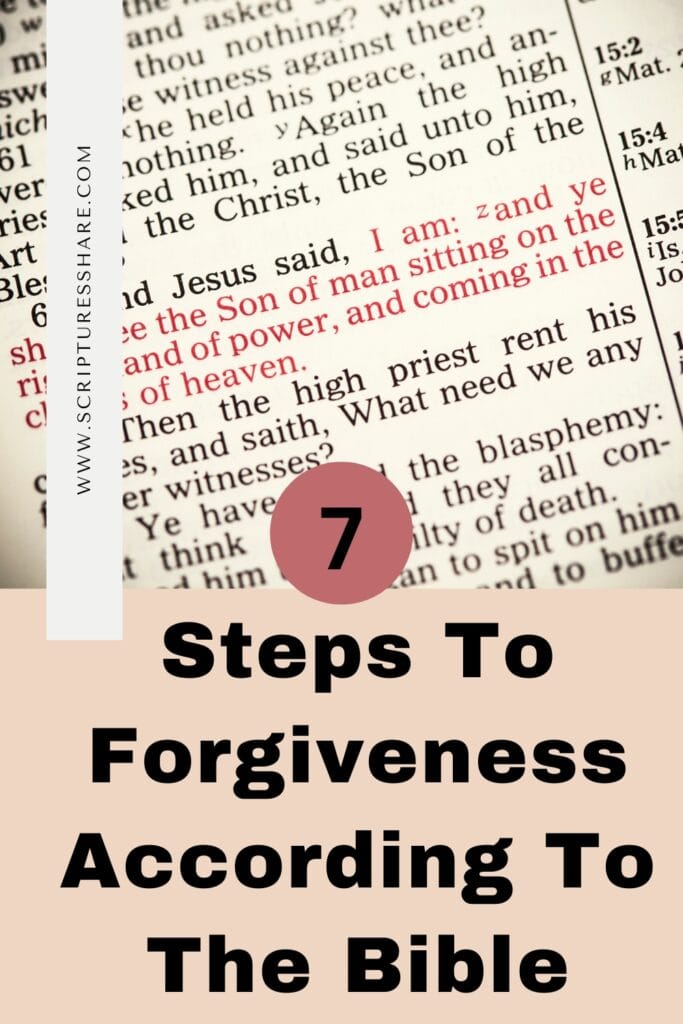No products in the cart.
7 Steps To Forgiveness According To The Bible
This post contains paid and/or affiliate links. I make a small commission at no extra cost to you. Please see our Privacy Policy.
Forgiveness is a key practice in the Bible. It helps heal wounds, mend relationships, and free our spirits. By following biblical steps, you can find peace and renewal in your life.
Here are the seven steps to forgiveness according to the Bible:
- Recognize the Need for ForgivenessThe first step is acknowledging that you have been wronged or that you have wronged someone. Understanding this is key for healing. Recall Matthew 6:14, where Jesus says we must forgive others to receive forgiveness ourselves.
- Feel Your EmotionsAllow yourself to feel the pain, anger, or disappointment from the hurt. The Bible tells us not to suppress our feelings. In Psalm 34:18, it says the Lord is near to the brokenhearted. Reflecting on your feelings is important for moving towards forgiveness.
- Pray for StrengthPrayer is vital. Ask for the strength to forgive and for wisdom to handle your feelings. Philippians 4:6-7 reminds us to present our requests to God, bringing peace that surpasses all understanding. This divine support makes the process easier.
- Release the BurdenLetting go of anger and resentment is key for healing. Holding onto these feelings only prolongs your hurt. As mentioned in Ephesians 4:31-32, we are told to put aside bitterness and anger, and to be kind and compassionate. This step frees you spiritually and emotionally.
- Forgive SincerelyChoose to forgive wholeheartedly. This means not just saying the words but genuinely wanting the best for the person who has hurt you. Colossians 3:13 teaches us to forgive as the Lord forgave us. When you forgive genuinely, you create space for healing.
- Communicate Your ForgivenessIf appropriate, let the person know that you’ve forgiven them. This can help restore the relationship and avoid misunderstandings in the future. Matthew 5:23-24 highlights the importance of reconciliation with others before presenting gifts at the altar.
- Move ForwardAfter forgiving, continue with your life. Engage in positive activities and nurture your emotional health. The Bible encourages us to focus on the good and seek joy for our own well-being. In Isaiah 43:18-19, we are reminded that God is doing a new thing and we should not dwell on the past.

These steps can significantly improve your emotional and spiritual well-being. Remember, forgiveness is a journey, not a destination.
By practicing these principles regularly, you can live a more fulfilling and peaceful life.
The love and grace in the Bible teach us to forgive. By taking these steps, we honor our faith and foster healthier relationships.
Forgiveness sets us free, allowing us to embrace the future with hope and compassion.
As you think about each step, consider keeping a journal. Writing down your thoughts and experiences can be a powerful tool for reflection. It also helps you track your progress as you engage in this transformative practice.
Forgiveness leads to liberation. Embrace these seven steps, and experience the profound change that comes from living a life filled with grace and love.
Power of Forgiveness: Healing Relationships Through Biblical Principles
Forgiveness is a deep concept in the Bible, leading to healing and transforming relationships. It lets us release anger, resentments, and past grievances, opening our hearts to reconnect.
When you understand and practice forgiveness according to biblical principles, you invite peace and renewal into your life and the lives of those around you.
Many biblical verses highlight the importance of forgiveness. For example, Ephesians 4:32 encourages us to “be kind and compassionate to one another, forgiving each other, just as in Christ God forgave you.” This instruction isn’t just a call to action; it invites you to reflect on your own experiences of grace and mercy. Here are key ideas to help you embrace the transformative power of forgiveness:
Understand the Nature of Forgiveness
Forgiveness, as the Bible teaches, is more than just excusing someone’s actions. It’s a choice that involves:
- Letting Go of Resentment: Holding onto anger only hurts you. Forgiveness frees you from the power of the offense.
- Replacing Anger with Love: Peace can’t grow with anger. Forgiveness lets love and understanding grow.
- Restoration of Trust: Forgiveness is key, but rebuilding trust takes time. It’s a vital step in healing relationships.
Recognize Your Own Need for Forgiveness
Before forgiving others, acknowledge your own flaws. Romans 3:23 says, “For all have sinned and fall short of the glory of God.” Knowing you need forgiveness too helps you understand others better.
Follow the Biblical Steps to Forgiveness
The Bible shows us how to forgive. Here are seven steps to help you forgive:
- Pray for Strength: Ask God to help you let go of hurt and fill your heart with compassion.
- Reflect on the Offense: Think about what happened and how it made you feel. Acknowledging your feelings is key to healing.
- Choose to Forgive: Make a conscious decision to forgive. This is an act of will, not just a feeling.
- Address the Issue: If right, talk to the person involved. Sharing your feelings can lead to mutual understanding.
- Release the Burden: Let go of the pain you’ve been carrying. Remember, forgiveness is mainly for your benefit.
- Embrace the Healing: Recognize the peace that forgiveness brings. This can mend your broken relationships.
- Continue the Process: Forgiveness is sometimes a journey. Be patient with yourself and repeat these steps as needed.
Practice Forgiveness in Daily Life
Forgiveness isn’t a one-time thing; it’s a daily practice. Try these daily activities:
- Daily Reflection: Take a moment each day to reflect on who you may need to forgive.
- Gratitude Journaling: Write down things you are grateful for, including those who’ve encouraged your growth.
- Encourage Others: Share your forgiveness journey with friends or family, and encourage them to embrace it too.
The Impact of Forgiveness
Forgiveness has a ripple effect, changing your relationships and emotional and spiritual well-being. Letting go of grudges makes room for love, peace, and joy. This shows the core message of the Gospel: love thy neighbor as yourself.
As you practice forgiveness, remember it reflects God’s love for us. The Bible reminds us of the grace we receive, urging us to give that grace to others. Embrace these biblical principles, and you’ll see the healing power of forgiveness in your life.
Conclusion
Following the 7 steps to forgiveness from the Bible can change your life and relationships. This guide helps you let go of resentment and experience deeper healing and reconciliation.
As you go through each step, you’ll see forgiveness isn’t just about excusing wrongs; it’s about freeing yourself from anger and bitterness.
The power of forgiveness goes beyond personal relief. It improves your relationships and fosters love and understanding.
By applying Biblical principles, you enrich your interactions with others, allowing grace and compassion to flourish. Remember, forgiveness is an act of strength that leads to healing and growth.
Engaging in this process may not always be easy, but the rewards are great. You’ll not only restore connections with others but also deepen your relationship with God. When you forgive, you align with His teachings and reflect His love in the world.
So take that first step today. Whether through prayer, reflection, or dialogue, choosing to forgive can spark a powerful change in your life.
As you embrace each step, you’ll find the journey of forgiveness is a blessing—both for yourself and those around you.















